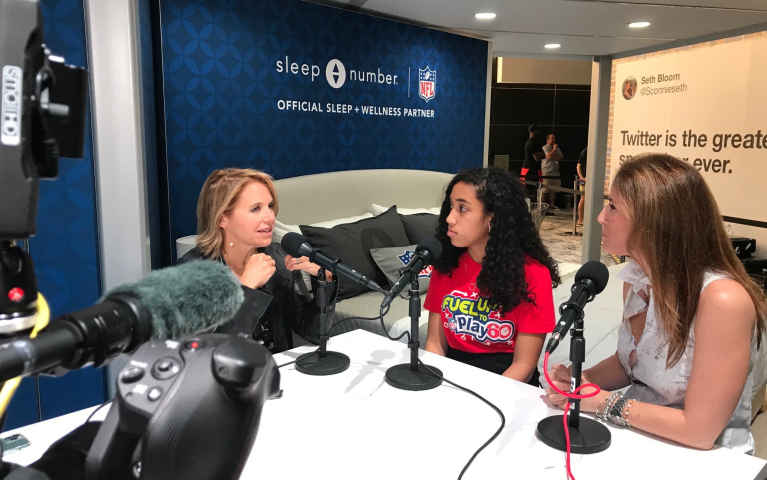Kayla Bello, a Fuel Up To Play 60 National Youth Council member, knows the importance of a good night's sleep for teens. Like typical freshmen, Bello had to adjust to earlier school start times and increasing demands of homework and extracurricular activities. “I used to wake up at 5 a.m. And sometimes I'd get home at 7 p.m. So that was like a really big struggle," says Bello. Burning the candle at both ends took a toll on her, as it does to teenagers across the country.
Teens and Sleep Deprivation
"Quality sleep, good nutrition and physical activity are three essential pillars that support the development of healthy, high-achieving youth," says Alexis Glick, CEO of GENYOUth, a nonprofit that empowers students to create a healthier future for themselves and their peers.
For Bello and other teens, sleep is often the first thing that gets pushed aside for their demanding schedules. Less than 50 percent of teens across the country are getting enough sleep, according to a youth insights survey conducted by GENYOUth in partnership with Sleep Number.
The survey also found 71% of students attend five days of school on four nights' sleep. “During the school week, kids are missing the equivalent of one full night of sleep," says Glick.
What's at Stake?
Sleep impacts physical, emotional and sexual development, as well as academic and athletic performance. Not getting enough sleep increases a child's risk of obesity, diabetes, injury and poor mental health.
"When I didn't have enough sleep, I felt like my mind, that it just had a weight on it. I didn't have the energy to do anything," says Bello. "Whenever I get a good night's sleep, I feel more focused in school. I'm able to really pay attention."
Sleep deprivation affects teens exactly when they can least afford it, with both immediate and long-term consequences, says Dr. Wendy Troxel, a clinical psychologist and behavioral sleep medicine specialist.
"One of the most profound impacts of sleep loss is the way it affects the brain. We do see strong links between sleep problems and the risk of mental health problems like depression, anxiety," says Dr. Troxel.
Getting to Better Sleep
To help teens make better choices when it comes to sleep, Sleep Number partnered with GENYOUth and Fuel Up to Play 60.
This triple initiative taught Bello and other teens across the country the importance of sleep in fueling their passions. Bello was one of 100 winners of a video contest aimed at promoting better sleep. Students and educators from 25 states submitted entries. Each winning entry received a Sleep Number 360® smart bed. People who routinely use the Sleep Number 360® smart bed's features improve their quality sleep by more than 15 minutes a night — nearly 100 more hours each year – by delivering personal insights into heart rate, breathing and movement, as well as natural sleep and wake cycles.* Studies show that even 15 more minutes of quality sleep per night increases a body's ability to stave off a cold or weight gain and can increase productivity. 100 schools will also receive a Super Sleep tool kit.
Bello says she's striving for a ripple effect from the better quality of sleep she'll get from her new smart bed. “When I show other students why sleep is so important and what they can do with it, then the benefits get transferred onto them. And then they can help more and more people, which I think is great," she says.
Teen Sleep Tips
When it comes to getting a good night's sleep, Bello now walks the talk. To help your teen get better sleep, share this video inspiration from Bello and other students.
-
Get at least 9 hours of sleep each night.
-
Stick to a schedule.
-
Limit screen time before bed.
-
Don't eat right before bed.
-
Turn off your phone before going to bed so it doesn't wake you.
-
Make your bedroom as comfortable as possible.
-
Prepare for bed by listening to relaxing music, taking a warm shower or reading a book.
-
When you first get into bed, take a few minutes to meditate. "It's just something to calm my heart rate down so I can get a good night's sleep," says Bello.
To hear even more about sleep's importance on students, watch Katie Couric's interview of Bello, along with nonprofit GenYOUTH CEO Alexis Glick:
“I realize this is something that needs to be prioritized in my life," says Bello. “I know that sleep is the most important thing for me right now."
Like nutrition and exercise, quality sleep is essential for optimal health and performance. To ensure kids and their families understand the impact of quality sleep and have the tools to achieve it, Sleep Number is committed to improving 1 million kids' lives through better sleep by 2025. For additional resources to help your teen get better sleep, visit Sleep Number Sleep Smarter. Perform Better. page, and visit a Sleep Number store find your Sleep Number® setting for your best possible night's sleep.
*Based on internal analysis of sleep sessions assessing sleepers who use multiple features of Sleep Number product, including foot warming, and who follow good sleep practices including those suggested by SleepIQ® insight.
